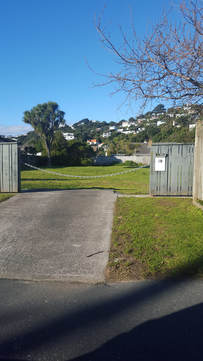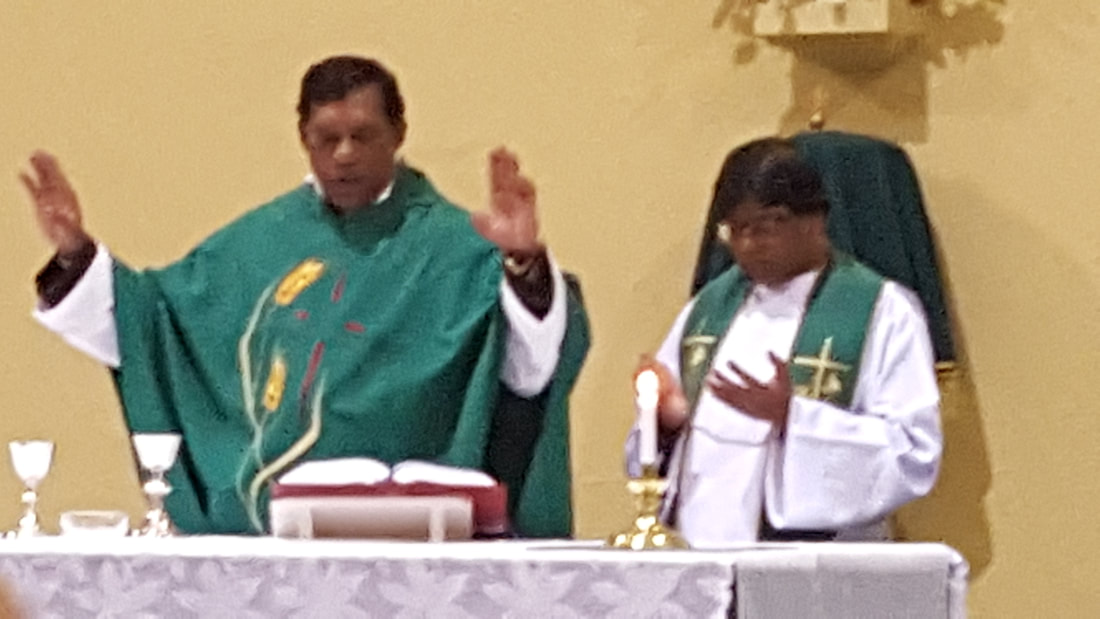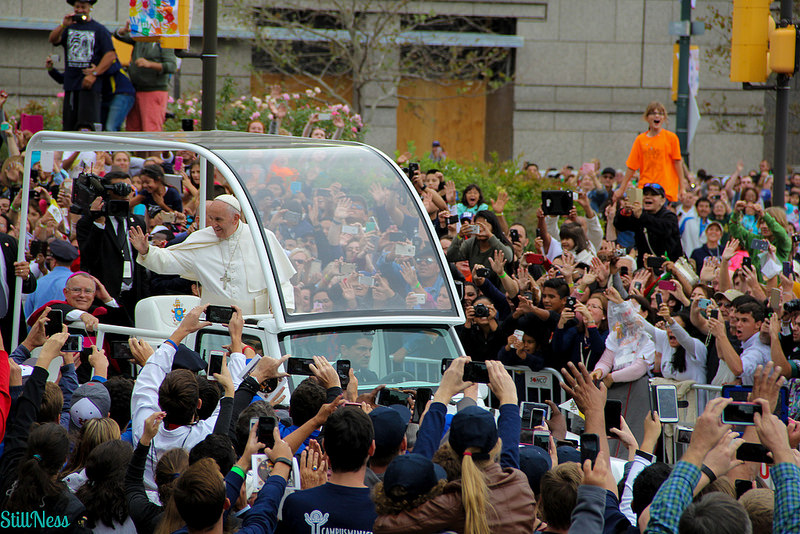AND NOW WE ARE THREEFr Paul joined Fr Ephrem and Gregory in July from India. He is from Ranchi in Northern India, home of Indian cricket captain Dhoni. As a student he very much wanted to be a priest. On the same day two offers of training arrived and he had to make a decision. In the end the decision was simple he was drawn to the example of St Francis and wanted to follow his way. St Francis separated himself from the wealth of his family, to live a simple life of devotion in the love and peace of Christ, motivated to help the less fortunate. The Caupicians, as followers of St Francis, became the obvious choice for Fr Paul. On making it to the seminary he met Fr Gregory and together they studied. While Fr Gregory went out into parish mission, Fr Paul stayed on at the seminary to lead the formation of new priests. He describes life in the seminary as disciplined, a structured way of life that helps to guide and form. During his time in the seminary he helped people to deepen their relationship with God and find the way in which they could share the message of faith with others. Fr Paul also took time to study in Rome and be involved in parish work. Seeing the mission work of three Caupicians in China he was drawn to pastoral work. It was a hard and difficult mission for the three priests but they persevered and saw results for their work. He patiently waited for the right opportunity for pastoral work. The right opportunity was Wellington, New Zealand. Fr Paul has arrived with an open mind and an open heart. He is on a three year work permit. Arriving at Holy Trinity Parish there has been an easy transition. Being back with Fr Gregory and meeting many new faces he is excited about what lies ahead. He has found New Zealanders to be relatively free of inhibitions and very approachable. More than anything Fr Paul sees his time in the parish as an opportunity for him to learn. Since arriving he has visited rest homes, schools and attended a formation day at Viard College. Concelebrating Mass with Fr Gregory, it is just like old times. With three priests now in the friary things become easier. Fr Paul is busy learning the rode code. With his driver’s license he will be ready and able to make a full contribution. If one priest is away there is better coverage and the parish can tick along without disruption. An immediate change will be a lot more pasta at meal times in the friary. While studying in Rome Fr Paul not only learnt to speak Italian he also learnt to cook Italian. BISHOPS SPEAKIn commenting on the upcoming general election the New Zealand bishops have commented on how the world is changing. Things like terrorism and fake news are challenging the way we see the world. We can make a positive difference. Our vote is important, it is a vote for New Zealand and what it can become. The Bishops have asked us to think about how we vote in terms of support of vulnerable people most particularly the very young and old. We have been asked to be supportive of immigrants and people of different ethnic background. Families need affordable housing, prisoners need a second chance and the mentally ill need support. Taxes to support government activity should be fair and in everything we do we should be caring for our planet as it’s the only one we’ve got. BEING ELECTION READY Following on from the advice of the New Zealand bishops, we emailed local Rongotai National representative Chris Finlayson and new Labour candidate Paul Eagle as well as all of the smaller parties asking them to comment on what their party seeks to achieve in light of the Bishops’ comments. We also asked them how they would vote on euthanasia given that any vote is likely to be a conscience vote rather than a party vote. We were a little surprised that neither Chris nor Paul have replied. We did however get a message from the Maori Party. They emailed back to say “Thank you for your email and apologies for the delayed response. Unfortunately our leaders unit are under considerable constraint at this stage and won't be able to forward through a comment on behalf of the party within the given timeframe. Ngā mihi“. Well, at least they responded! So, if by chance you meet any of the Rongotai candidates, here are some questions you might like to ask them: For some of the older members of our electorate they may not be able to care for themselves, they may not have family nearby, what happens if they can’t afford care in a place like Rita Angus? What can be done for them? Led by our St Vincent de Paul Society we have been helping refugees settle in to our area. Government has a role. What can be done to ensure we offer high quality, positive value-add support to make our former refugees feel at home as soon as possible? What support is there to ensure we know how they are settling in and that their needs are being met? Are we proud of our treatment of our refugee families and is there anything more we could or should be doing? There are large areas of government land in the Rongotai electorate including land where earthquake prone state houses have been pulled down. How can this land be used to help people struggling to get housing? We didn’t used to have beggars in our area, we do now. Some people say these people have mental health issues and need special care. Others say the benefit system doesn’t meet everyone’s needs and people fall through the cracks. Regardless, what do we need to change so that people don’t feel they have to beg to survive? When it comes to the environment, our electorate is kept clean by strong winds but we are just as polluting as other areas in the transport choices we make. How can the range of transport options be broadened so that we have less polluting options? ...OR TAKE THE DIY OPTIONInitiated by our St Vincent de Paul group in early 2016 and since led ably by Annette Bridgeman and her band of helpers simple efforts can make a big difference in people’s lives. 1. The SVDP visitor delayed their weekly visit until a couple of hours after lunch time before calling at the lonely person’s place. “Are you alright?” the visitor said. “Yes, yes,” she replied sobbing, “I just thought that no-one was going to come to see me today”. Our visit may be the only contact someone has had with another person in the week. This is an example of how much a visitor is appreciated by the lonely person, even if it doesn’t involve much to do. 2. A SVDP member visits elder parishioners in rest homes around the region. Some lonely residents meet only those who pass their door. Their family and friends may have died, or moved away, or cannot come and see them unless there is a crisis. The visits enable the lonely person to recall stimulating memories from the past and feel loved. 3. A father of school-age children lost his job and was out of work. The family was in dire need as the mother suffered from ill-health and could not work. Over several weeks, a SVDP member took around a bag of food items, toiletries, milk and bread each week from the foodbank. This small donation helped the parents cope with the needs of their children, and showed them they were not completely alone in their troubles. 4. A refugee family was really struggling to make ends meet after arrival in New Zealand whilst the adults looked for employment, but straightaway the kids needed uniform items, shoes and stationery for school. Kind parishioners had made donations for local students in such dire need. The SVDP member met the family at the shops, helped them choose the right gear over a couple of hours, and paid the shops directly for the goods from parishioners' donations. We hope we showed them our Holy Father’s assurance to migrants and refugees that “they have a special place in the heart of the Church”. 5. Through a hospital chaplain we learnt of two overseas visitors who had dashed to NZ to be with their hospitalised son (who thankfully recovered). The cost of airfares and motel was tough, leaving little for food. SVDP members took bags of food to them during their stay and drove them to the airport departure. The parents expressed their “heartfelt appreciation for receiving such love and help from strangers on the other side of the earth”. A St Vincent de Paul member and a parish pastoral council member are teaming up at our seven Masses across Holy Trinity Parish on the last Sundays of July, August and September to seek our prayers for those in need, boost their membership and parish participation, asking us to be watchful to those in need, and resurrecting the Conference of St Vincent de Paul in St Patrick's Church community Kilbirnie. SUNDAY GOSPELSWhen we have read ahead, when we have reflected on the Sunday Gospel coming up, we are ready to fully participate in the liturgy of the Word. Rather than the Sunday Gospel being a surprise and we are trying to keep up, we are in amongst it, hearing what it has to say for us. The following Sunday Gospel summaries are to help you join in our Sunday celebration. Sunday 6 Aug – Mt 17:1-9 See Jesus in a new light. He is the beloved son. He is present for us. The glory of God has been brought to a human level so we can understand. https://www.youtube.com/watch?v=Ub7kwmQipLM&index=23&list=PLeDNiKpHSQBCBkgGtJ8PkooBg6ajG0C-- Sunday 13 Aug – Mt 14:22-33 Sometimes we have to get out of our comfort zone and go beyond our fears to make a difference. https://www.youtube.com/watch?v=sNHdNsVH1sw Sunday 20 Aug – Mt 15:21-28 Honest persistence gets heard. Jesus recognises our faith. We try, we don’t seem to make progress but when we look back things have changed, we have been guided. https://www.youtube.com/watch?v=xNubPq2Z8Vo&index=18&list=PLeDNiKpHSQBCBkgGtJ8PkooBg6ajG0C-- Sunday 27 Aug – Mt 16:13-20 If Jesus asked who you are, what would you say? Peter was a great example of faith in the face of doubt. He didn’t always get it right but he is a great example for us to follow. https://www.youtube.com/watch?v=txwDyqrs-VA&index=19&list=PLeDNiKpHSQBCBkgGtJ8PkooBg6ajG0C-- POPE FRANCIS ON CHRISTIAN HOPEToday we reflect on Christian hope as the strength of martyrs. When in the Gospel Jesus sends the disciples on mission, he does not mislead them with mirages of easy success. On the contrary he warns them clearly that the proclamation of the Kingdom of God always involves opposition. And he also uses an extreme expression: “and you will be hated — hated — by all for my name’s sake” (Mt 10:22). Christians love but they are not always loved. Jesus places us before this reality from the start. In a somewhat strong measure, the confession of faith occurs in a hostile climate.
Christians are therefore men and women who “go against the tide”. It is normal: because the world is marked by sin which manifests itself in various forms of selfishness and injustice; those who follow Christ walk in the opposite direction. Not due to an argumentative spirit, but because of loyalty to the rationale of the Kingdom of God, which is a logic of hope that translates into a lifestyle based on the instructions of Jesus. And the first instruction is poverty. When Jesus sends his [disciples] on a mission, it seems that he takes more care to “strip” them than to “clothe” them! In effect, a Christian who is not humble and poor, detached from wealth and power and, above all, detached from self, does not resemble Jesus. Christians travel their path in this world with the essentials for the journey but with their heart filled with love. The true defeat for him or for her is to fall into the temptation of revenge and violence, responding to evil with evil. Jesus tells us: “I send you out as sheep in the midst of wolves” (Mt 10:16). Therefore without jaws, without claws, without weapons, the Christian will have to be rather prudent; at times even shrewd. These are virtues that are accepted by the logic of the Gospel. But never violence. In order to overcome evil, one cannot use the same methods of evil. The only strength Christians have is the Gospel. In difficult times, one must believe that Jesus is before us and does not cease to accompany his disciples. Persecution is not in contradiction to the Gospel but rather is part of it. If they persecuted our Teacher, how can we hope to be spared the fight? However, in the midst of the storm, Christians must not lose hope, thinking that they have been abandoned. Jesus assures his disciples: “even the hairs on your head are all numbered” (Mt 10:30); as if to say that none of man’s suffering, not even that which is most minute and hidden, is invisible to the eyes of God. God sees and certainly protects; and he will give his redemption. There is in fact in our midst Someone who is stronger than evil, stronger than the mafia, than the obscure conspiracies of those who profit at the expense of desperate people, than those who crush others with disdain.... Someone who has always listened to the cry of Abel’s blood from the earth. Christians therefore, must always be found on the “opposite side” of the world, that chosen by God: not persecutors but persecuted; not arrogant but meek; not charlatans but submissive to the truth; not imposters but honest men and women. This fidelity to Jesus’ style — which is a style of hope — until death, was to be called a beautiful name by the first Christians: “martyrdom”, meaning “witness”. There were so many other possibilities offered by the vocabulary: it could have been called heroism, abnegation, self-sacrifice. Yet the Christians of the first hour identified it with a term that suggests discipleship. Martyrs do not live for themselves; they do not fight to assert their own ideas, and they accept having to die solely out of loyalty to the Gospel. Martyrdom is not even the supreme ideal of Christian life, because over and above it there is charity, that is, the love of God and of neighbour. The Apostle Paul says it very well in the hymn to charity, understood as love of God and of neighbour: “If I give away all I have and if I deliver my body to be burned, but have not love, I gain nothing” (1 Cor 13:3). The idea that suicide bombers may be called “martyrs” is repulsive to Christians: there is nothing in their quest that can come close to the attitude of the children of God. Sometimes, reading the stories of so many of yesterday’s and today’s martyrs, — who are more numerous than the martyrs of the early days — we are amazed at the strength with which they have faced the supreme trial. This strength is a sign of the great hope that animated them: the certain hope that nothing and no one could separate them from God’s love given to us in Jesus Christ (cf. Rom 8:38-39). May God always give us the strength to be his witnesses. May he give us the opportunity to live out Christian hope especially in the hidden martyrdom of performing our daily obligations well and with love.
1 Comment
25/4/2019 01:20:05 pm
Since the article was quite long, I wasn't able to finish it. But I know that it has something to do with our faith, that's why I am so excited to see what could be the result of the upcoming election. There will be several twists that can happen, but let's hope for a clean election because we have been so fed up with so many things that happened! God will always guide people who are good, so let's hope that the same thing will happen on the election!
Reply
Leave a Reply. |
SHARINGIf you have news and views to share please email them to: [email protected] Archives
December 2018
Categories |


 RSS Feed
RSS Feed